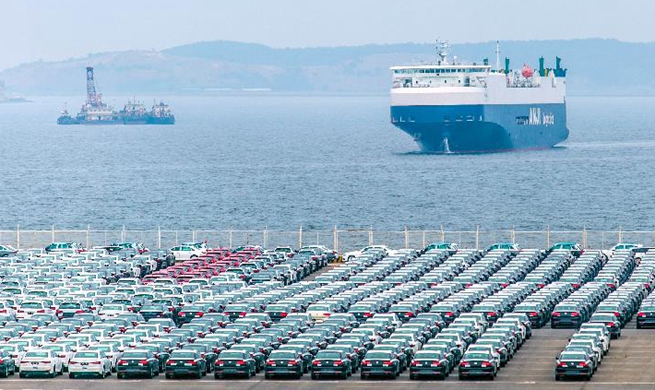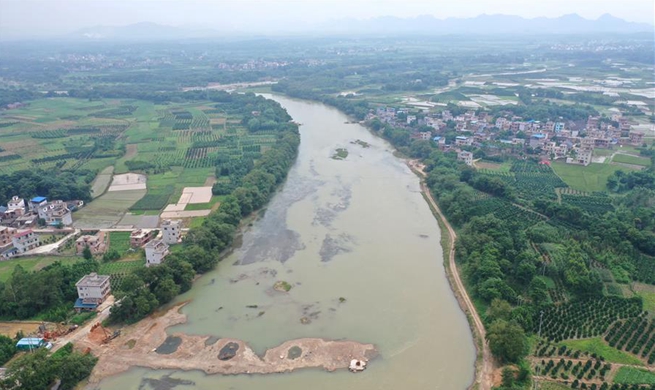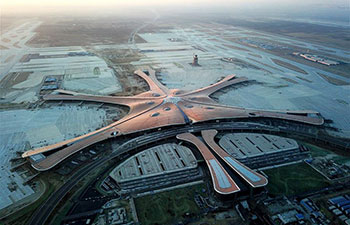MEXICO CITY, July 1 (Xinhua) -- Families and friends on Monday buried Oscar Martinez and his 23-month-old daughter Valeria in a cemetery in their home country of San Salvador, days after they drowned while trying to cross the Rio Grande into the United States.
According to Salvadoran media, the burial of the 25-year-old migrant and his young daughter was carried out privately at the family's request in the La Bermeja cemetery, south to El Salvador's capital.
About 50 mourners with white flowers gathered in the cemetery for the farewell ceremony, according to media reports.
Oscar and Valeria died on June 23 when they were swept away by the current of the Rio Grande that divides the Mexican state of Tamaulipas and the U.S. state of Texas.
Authorities recovered their bodies on the morning of June 24 on the shore of the Mexican side. The young girl had been tucked inside her father's shirt.
Devastating images of the deceased father and daughter have sent shockwaves throughout the world, shedding light on the harsh realities experienced by migrants attempting to enter the United States.
The bodies of Oscar and Valeria arrived on Sunday in San Salvador after being transported by land from Mexico.
Martinez and his wife lived at San Martin, a municipality in the department of San Salvador, and worked at a restaurant.
They migrated in April in search for better opportunities in the United States and remained in Mexico until they decided to make the attempt to cross the river.
Similar tragedies happened. On June 25, U.S. Border Patrol recovered a man's body from another stretch of the Rio Grande in Texas.
Several more have drowned this year. U.S. Border Patrol reported about more than 280 migrant deaths in 2018, while activists say the real death toll is much higher as the remains of many migrants were never found in the rugged terrains of the U.S.-Mexico border of some 3,000 km.
Millions of people in the so-called northern triangle of central America -- Guatemala, El Salvador and Honduras -- have pegged their hope to escape famine, poverty and violence on going north, Wang Peng, an expert with China Academy of Social Sciences said.
Yet the road to the United States is no easy trip. They have to brave through desert heat, treacherous water and violent criminals. On May 17, the U.S. Border Patrol issued a warning against what it called an "alarming trend" of migrants venturing into the river with young children.
The tragedies stirred up a new wave of outcry against the chaotic U.S. immigration policies and the tug of war between Republicans and Democrats on this issue.
U.S. presidential candidate Bernie Sanders blamed the death of Oscar and Valeria on U.S. President Donald Trump's immigration policies. He wrote on Twitter, "Trump's policy of making it harder and harder to seek asylum -- and separating families who do -- is cruel, inhumane and leads to tragedies like this."
Trump in turn blamed the Democrats, whom he said were blocking his government's attempts at closing "loopholes" in U.S. law that encourage migrants to apply for asylum.
The U.S. Senate on June 25 passed a 4.6-billion-U.S. dollar emergency funding bill to tackle the continuous migrant surge along the U.S.-Mexico border, one day after the House of Representatives approved its own version, largely along their party lines.
On the Senate floor, Senate Minority Leader Charles Schumer displayed the photo of the deceased Salvadoran father and daughter, escalating the debate over the treatment of children at the U.S.-Mexico border and the pressure for the two parties to reach an agreement.
It remains unclear whether the two chambers of Congress can reconcile their conflicting proposals before the lawmakers leave for the July 4 recess.
Trump had promised to replace the rusty fences on the U.S.-Mexico border with massive walls of 15 meters tall, which needs some 5.7 billion U.S. dollars to start with and will eventually cost more than 20 billion. The Republicans and Democrats have fought battles in Congress over the funds, only to result in record-breaking government shutdowns.













